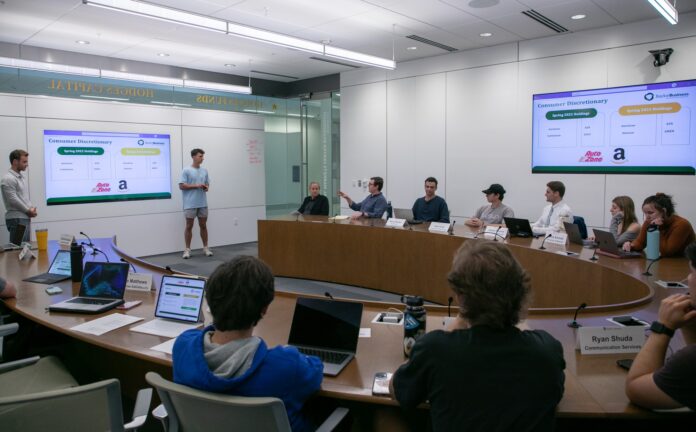
By Shelby Peck | Staff Writer
Surrounded by stereotypes of microwave noodles and empty wallets, college students aren’t usually trusted with large amounts of money — especially $14.5 million. The Hankamer School of Business provides its students a unique, hands-on opportunity to manage over $14.5 million of endowments and donations through the large-cap portfolio management practicum.
“We have real money, and we’re making real investment decisions, so it’s very hands on … we’re not getting some material then taking a test and forgetting about that material. It really helps you form critical thinking,” Houston senior Olivia Schmidt said.
Schmidt, a finance major, said the large cap focus of the class relates to her post-grad plans. Anticipating the considerable jump from undergraduate to corporate America, she wanted to push herself mentally and physically for life after college. She chose to take the class to “brush up on all those skills” she will need as she enters the world of finance.
Since 2009, the class has been taught by Brandon Troegle, lecturer in finance, insurance and real estate, and spans one semester throughout which students present and review various stocks weekly.
The class is largely discussion-based and team focused, designed after “the operational format of a funds management firm.”
Trogele said the aim of the class is to give students an “experiential learning” opportunity.
“The founding professors had a vision of what this should be. That vision was bringing the real world into the classroom. … It’s not textbook based, pretty practical experience. We’ve been in the room making investment decisions,” Troegle said.
In terms of practical experience, presentation skills, building skills looked for by employers and learning to convince and write well, Troegle said this class is essential to any student interested in the investment industry. The class is competitive, and students must apply to get in.
Students range from those who already have completed investment interests to those who have never invested stocks whatsoever.
“He’s not just a professor; he is currently in the industry, and you know he just started this for fun on the side, and so hearing about his real life experience and having someone that’s in the industry is really helpful as well,” Schmidt said.
Flower Mound senior Ryan Shuda said his experience in the class is enhanced by Troegle’s “wealth of experience” brought to class each day. He said it helps students know the industry better and how to excel in the class.
“Obviously, in presentations they’re able to ask really insightful questions to help us determine better whether this is a stock we ought to own or not,” Shuda said.
Students receive two grades in the course — a round one presentation and a round two presentation. Though the class requires time and diligence, Highland, Calif., senior Kyle Underwood said the clear expectations presented in the first few weeks of class, accessible meetings and model of stocks that fit in the portfolio have all contributed to his success.
“Taking it from an investing approach is quite different rather than just learning. It’s now that we get to put the theory into actual practice,” Underwood said. “We have to think about a bunch of different things, and you know, what are some key things investors might look for.”
Schmidt, Shuda and Underwood each said they recommend the class to finance majors, whether the goal is to build one’s resume, gain real world experience or be challenged academically.
“Getting that real world experience where you’re actually … providing value for Baylor scholarships is really something that’s awesome to work on,” Underwood said. “It feels pretty rewarding at the end of the day, especially when you’re successful.”
Troegle said he greatly appreciates seeing the career trajectories of his students, some of them already 15 years into their finance journeys. He said it is fun to see their “career progressions” impact the Baylor community.
“I really enjoy the students I’ve taught even though it’s, you know, it’s a short time you spend with them,” Troegle said. “You see a lot of them in this class. You see a lot of growth in these students from where they start this semester to where they finish.”





